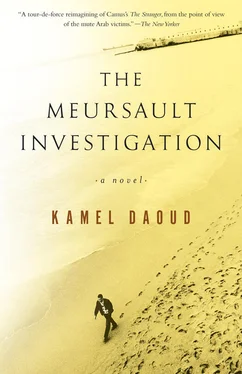Ah, Fridays!
Remember the bar ghost, the guy who has a way of circling around us, as though he’s trying to hear me better or steal my story? Well, I often wonder what he does with his Fridays. Does he go to the beach? To the movies? Does he too have a mother, or a wife he likes to kiss? Intriguing mystery, eh? Have you noticed that generally, on Fridays, the sky looks like sagging sails, the shops close, and the whole universe is deserted by noon? That’s when a kind of feeling grips my heart, the sense that I must have committed some secret fault. I went through so many awful days like that in Hadjout, and always with the sensation of being stuck forever in a deserted railroad station.
For decades I’ve stood on my balcony and observed these people: killing one another, rising again, waiting forever, hesitating over their departure schedules, shaking their heads, talking to themselves, digging in their pockets like panicked travelers, looking at the sky instead of a watch, surrendering to strange venerations, digging holes to lie in so they can meet their God sooner. I’ve observed these people so often that today I see them as a single person, a man I avoid talking to for any length of time and keep at a respectful distance. My balcony overlooks the city’s public space: broken playground slides, a few scrawny, tormented trees, some dirty staircases, some windblown plastic bags clinging to people’s legs, other balconies decorated with unidentified laundry, water cisterns, and satellite dishes. My neighbors bustle about before my eyes like familiar miniatures: a mustachioed retired military man who washes his car with infinitely drawn-out, almost masturbatory pleasure; another man, sad-eyed and very dark, who’s discreetly charged with handling the rental of chairs, tables, dishes, lightbulbs, and so forth for funerals as well as for marriages. There’s a fireman with a bad limp who regularly beats his wife and who stands on the landing of their apartment at dawn — because she always ends up throwing him out — and begs her forgiveness, all the while shouting his own mother’s name. And nothing else but that, for God’s sake! Well, I suppose you’re familiar with that sort of thing, even though you’ve lived in exile for years, or so you claim.
I’m telling you about this because it’s one side of my universe. My other balcony, the invisible one in my head, looks out over the scene with the white-hot beach, the impossible trace of Musa’s body, and the sun, fixed above the head of a man holding a cigarette or a revolver, I can’t really tell. I see this scene from far off. The man has brown skin, he’s wearing a pair of shorts a bit too long for him, and his silhouette’s rather slight; he seems to be propelled, his very muscles seem to be tensed, by some blind force, as if he’s a robot. In one corner, there are a few pilings holding up a bungalow, and at the other end, the rock that marks the limit of this universe. The scene never changes, and I beat against it like a fly against a windowpane. It’s impossible to penetrate. I can’t step inside and run across the sand and change the order of things. What do I feel when I see this scene, over and over? The same things I felt when I was seven years old. Curiosity, excitement, the wish to pass through the screen or follow the white rabbit. Sadness, because I can’t clearly make out Musa’s face. Also anger. And always, the urge to weep. Feelings grow old slowly, not as fast as skin. Maybe someone who dies at the age of a hundred doesn’t feel anything more than the fear that grips us when we’re six and it’s nighttime and our mother comes in to turn out the light.
In this scene where nothing moves, your hero doesn’t look at all like the other one, the one I killed. He was big, vaguely blond, with enormous circles under his eyes, and he always wore the same checked shirt. Who was he, this other one? You’re wondering, right? There’s always another, my friend. In love, in friendship, or even on a train, there he is, the other, sitting across from you and staring at you, or turning his back to you and deepening the perspectives of your solitude.
And so there’s one in my story too.
I squeezed the trigger and fired twice. Two bullets. One in the belly, and the other in the neck. That makes seven all told, I thought at once, absurdly. (But the first five, the ones that killed Musa, had been fired twenty years earlier …)
Mama was behind me, and I could feel her eyes on my back like a hand pushing me, holding me upright, guiding my arm, slightly tilting my head at the moment when I took aim. The face of the man I’d just killed kept its look of surprise — big, round eyes and grotesquely contorted mouth. A dog barked in the distance. The lemon tree in the courtyard of our house trembled under the black, hot sky. My body was entirely rigid, as though frozen by a cramp. The butt of the gun was sticky with perspiration. It was night, but everything was clearly visible. Because of the luminous moon. It looked so close, you could have jumped up and touched it. The man was giving off his last drops of terror sweat. He’s going to sweat until he returns all his water to the earth, I said to myself, and then he’ll steep for a while and mingle with the mud. I began to imagine his death as a disintegration of elements. The monstrousness of my crime would vanish with them somehow. It was not a murder but a restitution . I also thought — even if it may seem odd for a kid like me — that he wasn’t a Muslim, and that therefore his death wasn’t forbidden. But that was a coward’s thought, and I knew it right away. I remember the look in his eyes. He wasn’t even accusing me, I don’t think, he was just staring at me the way you stare at an unexpected dead end. Mama was still behind me, and I could gauge her relief by her breathing, which calmed down and suddenly became very soft. Before, she’d done nothing but wheeze. (“Ever since Musa died,” a voice said to me.) The moon was looking on too, it too; the whole sky seemed to be nothing but moon. It had already begun to soothe the earth, and the damp heat was rapidly diminishing. The dog somewhere on the dark horizon started barking a second time, at length, and nearly roused me from the languor I’d fallen into. I found it ridiculous that a man could die so easily, that he could conclude our acquaintance with such a theatrical, almost comic collapse. My temples were throbbing from the deafening panic in my heart.
Mama made no move, but I knew she had just withdrawn her immense vigilance from the universe. She was packing her bags, on her way to meet her old age, which she’d finally earned. I knew it instinctively. I could feel the icy flesh in my right armpit, under the arm that had just destroyed the balance of things. “Maybe things are finally going to return to the way they were,” someone said. I heard voices inside my head. Maybe it was Musa who was talking. When you kill someone, there’s a part of you that immediately starts devising an explanation, making up an alibi, putting together a version of the facts that washes your hands clean, even though they still smell of gunpowder and sweat. But I didn’t really think I had anything to worry about. I’d known for years that when I killed somebody, I wouldn’t have to be saved, judged, or questioned by anyone. Nobody kills a specific individual during a war. It’s not a question of murder, it’s a question of battle, of combat. Now, outside, far from both the beach and our house, there was indeed a war going on, the War of Liberation, which stifled rumors of all other crimes. It was the first days of Independence, and the French were running in all directions, stuck between the sea and defeat, and the people, your people, were jubilant, they arose, dressed in their overalls, they extricated themselves from their siestas under the rocks and started killing in their turn. That would suffice as my alibi, just in case — but I knew, in the deepest part of me, that I wouldn’t need any such thing. My mother would see to that. And besides, he was only a Frenchman, no doubt running away from his own conscience. Basically I felt relieved, unburdened, free in my own body, which had finally stopped being destined to murder. Like a flash — like a shot! — I had a sense of immense space, I grew dizzy at the possibility of my own freedom, I felt the hot, sensuous dampness of the earth and smelled the lemony perfume in the hot air. It occurred to me that I could finally take in a movie or go swimming with a woman.
Читать дальше












